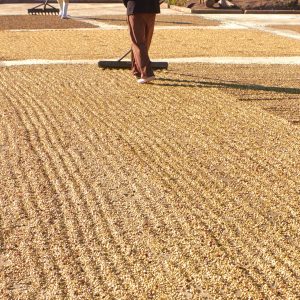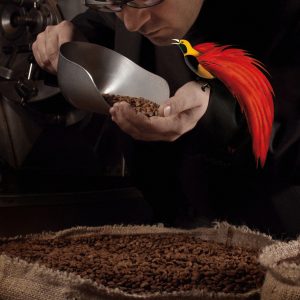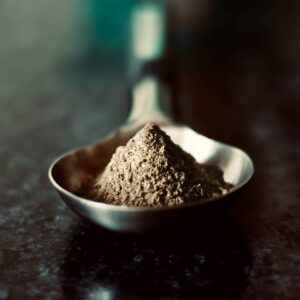Single Estate
Single Estate, adj.: single-origin coffee from a single farm or a small, select cultivation area, e.g., “middle of the southern slope”.
Single origin
Single origin, adj.: Indicates coffee of one variety that comes from a single cultivation area. In and of itself, it is not a statement as to the quality of the coffee, however, since only unique coffees have the potential to be enjoyed purely, single origins are indeed something special. It is the opposite of a blend.
Soil erosion
Soil erosion, noun: The wearing away of layers of soil through overgrazing, deforestation and removal of vegetation. The causes include wind and water. Companion planting with shade trees in organic coffee cultivation, humus formation and mulches prevents soil erosion. Industrial plantation cultivation (monocultures) promotes soil erosion.
Stripping
Stripping, verb (also strip picking): Here, all coffee berries are “stripped off,” even the unripe and overripe ones. This is mostly a mechanical process. It subsequently requires very precise quality control processes in order to sort out the unusable beans. It is the opposite of picking or selective picking.
Terroir
Terroir, noun: From the French “terre,” meaning land. The term originally comes from wine cultivation. It describes the natural factors of a parcel of land that influence the characteristics of the plants cultivated there: Climate, geology, topography and soil conditions. It is also now used to describe the quality of coffee. Single origin coffee is sometimes also called “terroir coffee”.
Vergesellschaftung
Vergesellschaftung, Subst., f, beschreibt eine „Lebensgemeinschaft“ von unterschiedlichen Pflanzen. Im Kontext von Kaffeeanbau ist damit das Anpflanzen von Nutz- und Schattenpflanzen zwischen den Kaffeesträuchern gemeint.
Wet preparation
Wet preparation, noun (also washed or lavado) Processing method for coffee. The presorted berries are pulped (their pulp is removed) and then stored in a water tank for 12 to 36 hours. There, the residual pulp ferments together with the pectin layer (“mucilage”) and can thus fall off the parchment coffee. Afterwards, the coffee is washed again in order to rinse off any residual pulp. Arabicas are almost always prepared wet since this method allows their flavors to develop particularly well. The beans are subsequently dried down to a moisture of approximately 11.5%. With our Arabicas, we do this using drying beds in the sun instead of mechanical drying.
Encyclopedia
Categories
- Bio-Certificates (16)
- Coffee Culture (8)
- Coffee Growing (37)
- Coffee Maker (43)
- Coffee Production (22)
- Coffees (16)
- Growing Areas (13)
- Ingredients (11)
- Nachhaltigkeit (13)












